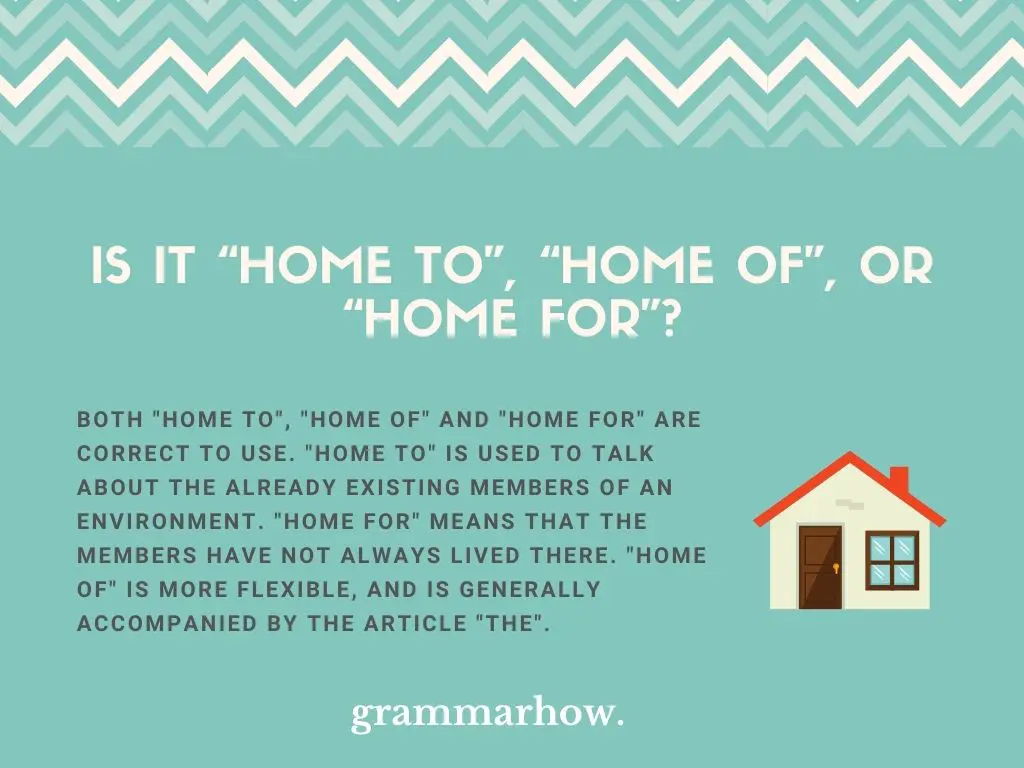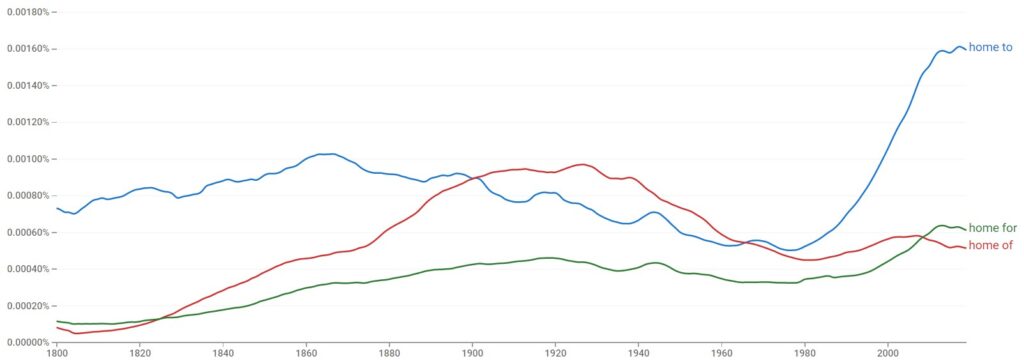The following article discusses the differences between “Home to”, “Home of” and “Home for”, properly explaining when each should be used. To clarify what makes each expression unique, examples will be used.
Is It “Home To”, “Home Of”, Or “Home For”?
Both “Home to”, “Home of” and “Home for” are correct to use. “Home to” is used to talk about the already existing members of an environment. “Home for” means that the members have not always lived there. “Home of” is more flexible, and is generally accompanied by the article “the”.

“Home of” can also be used to describe the passage of time for a specific inhabitant in a specific place.
As you can see, all three phrases express the same thing, broadly speaking. The differences are not radical and are more about the specific context in which they are used.
When Should I Use “Home To”?
The phrase “Home to” is generally used to refer to the residents of a given place. When using the expression, the implication is that these residents have existed in the place for a long time.
Here are some example sentences to display the specific use of “home to”:
- In spite of being an inhospitable region, The Saharan desert is home to dozens of unique animals, including mammals, reptiles, and birds.
- According to data from 2019, Venezuela is home to 44 indigenous tribes that make up approximately 2.8% of the population.
- Minneapolis is home to 2,967,000 people, based on the latest research.
- Hollywood is home to the “Big Five” major production companies.
- According to the Amazon Aid Foundation, The Amazon Rainforest is home to 40,000 kinds of plants.
- France is home to some of the best restaurants in the world.
- The beach is home to the hermit crab.
- Las Vegas is home to some of the world’s biggest casinos.
When Should I Use “Home Of”?
The phrase “home of” can also be utilized to describe the residents that inhabit a specific place, but it is more variable, and can also be accompanied by an article such as “the”.
These example sentences will showcase the great range of situations in which using “home of” is acceptable:
- You know, after the 1970s, the United Kingdom is often considered to be the home of punk music as we now know it.
- “The Star-Spangled Banner” is the United States’ national anthem, and it talks about how America is “the home of the brave”.
- This house has been the home of many people I love, and I am going to be saddened to finally sell it.
- The home of the culprit was found abandoned, with the individual clearly having not resided in it for over six months at least.
- This beautiful state is the home of the world’s largest Coca-Cola factory.
When Should I Use “Home For”?
“Home for” implies the residence of something or someone, but it specifically implies that the residents themselves have not always been in this place. It can also be used to describe an arrival towards the place itself, or the passage of time.
The specific nuance of what makes this expression unique can be a little hard to understand, so these example sentences should help clear any misunderstandings:
- In the “X-Men” comic books, the Xavier School is a home for strange or unique individuals born with superpowers.
- In spite of all the issues I’ve had this week with my passport, I think I will be home for the wedding after all.
- The charity home for abandoned children is requesting more funding from the state council, in order to provide better care.
- The Statue of Liberty symbolizes the fact that New York has historically been a home for immigrants from elsewhere.
- When the pandemic started, this hotel unexpectedly served as a home for the stranded tourists who could not yet return to their countries of origin.
- The orphanage has always been a home for the weak and the helpless.
- I will be home for Christmas this year.
- The country has served as a home for immigrants who have nowhere else to go.
Are “Home To”, “Home Of”, And “Home For” Interchangeable?
These three expressions are not always interchangeable. Though they all express the same thing, in different ways, these different ways of expression mean that you can’t always use one instead of the other.
When talking, for example, about a specific animal that lives in a specific environment, you could probably use either “home to” or “home of”, but utilizing “home for” in that specific context would be wrong.
Meanwhile, the common phrase “to be home for the holidays” makes no sense with either “home of” or “home to”. The way to express that someone will be in their home by the time the holidays occur is solely through “home for”.
Ultimately, all three phrases always imply a relationship between an environment and its inhabitant. But the ways in which they imply this relationship means that they are often not interchangeable.
Is “Home To”, “Home Of”, Or “Home For” Used The Most?
The phrase “home to” is used the most out of the three expressions.
This graph from Google Ngram Viewer helpfully demonstrates the fact that, broadly speaking, “home to” has been used the most out of all these expressions.

“Home to” is represented by the blue line, and we can see that in spite of being temporarily overtaken by the red line, “home of”, from 1900 to 1965, “home to” is still the one most commonly found in literature.
The green line represents “home for”, and though historically it had been the most unpopular of the three, from 2008 to the present day it has seen more use than “home of”.
The graph also illustrates the fact that these trends are not fixed. At one point in time, “home of” and “home for” were increasing in their use, while “home to” was decreasing. What is commonly used can easily vary over the years.
You may also like: “In The Home” or “At Home” – Difference Explained (With Examples)

Martin holds a Master’s degree in Finance and International Business. He has six years of experience in professional communication with clients, executives, and colleagues. Furthermore, he has teaching experience from Aarhus University. Martin has been featured as an expert in communication and teaching on Forbes and Shopify. Read more about Martin here.
